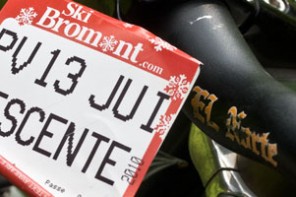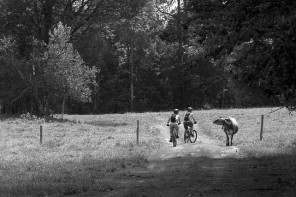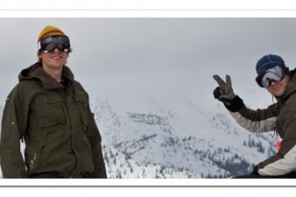We just received this message from friend Berne Broudy. Please take a moment to read this and by all means and take action!
Hi All-
There is a new proposed rule to “regulate” public activities on lands owned by Vt Fish and Wildlife. The rule would put a blanket ban on mountain biking, climbing and other “incompatible” activities on 133,000 acres of lands.
The new rule has been approved by the Fish and Wildlife Board, which is currently accepting public comment via email and at two meetings. The first meeting is tomorrow (Tuesday) in Montpelier, The second is Thursday in Castleton.
If you can attend the meetings, please do. More information on the ruling can be found here. Comments can be submitted here. And more info on the meetings can be found here.
If you want to write a letter but are pressed for time, the Access Fund, a climbing advocacy group, has drafted an excellent letter geared towards keeping climbing open on these lands here. Tweak it slightly and it works for mountain biking too. The Access Fund letter asks Fish and Wildlife to consider each piece of land individually, not to create a blanket rule.
Thanks for taking the time to do this. Please spread the word to others in your clubs.
Warmly, Berne






As an active hunter, avid mountain biker, and outdoor enthusiast I am a regular user of Vermont’s public lands. I care deeply for the places I visit. Experiencing wildlife and natural beauty is important to me. Protecting an area’s ecology is central to conserving the outdoor biking, hiking and hunting experience. Biking is a low-impact activity that when managed properly poses no threat to wildlife.
According to the Outdoor Industry Association, more than 140 million Americans make outdoor recreation a priority in their daily lives, proving it with their wallets by putting $646 billion of their hard-earned dollars right back into the economy. This spending directly results in highly sought-after jobs for 6.1 million Americans. The Vermont recreational economy supports 35,000 jobs; generates $187 million in annual state tax revenue; and, produces $2.5 billion annually in retail sales and services across Vermont.
Most bikers are stewards and conservationists that regularly volunteer to help maintain the places they bike . Allowing biking on Vermont Fish & Wildlife Department Lands will provide more opportunity for recreation and help stimulate the local economy. There are numerous examples, such as the Fred Johnson WMA, that demonstrate biking and wildlife protection are compatible.
Please include Recreational Biking under the list of Authorized Activities in 10 V.S.A. App. § 15 Rule Governing Public Use of Vermont Fish and Wildlife Department Lands. Section 4.2 of the proposed rule allows the Department to prohibit “Authorized Activities for purposes such as, but not limited to: animal and/or habitat management, plant protection, habitat restoration or public safety.” Section 4.2 ensures that the State will have the authority to restrict biking anyplace where it is incompatible with Department goals. Thus, a wholesale restriction is unnecessary.
It seems odd that the VT Fish & Wildlife would try to ban the group that does the most to keep large tracts of trails clear, clean, and maintained It appears on the outside that the voice of one group (could it be the hikers?) is the only one being heard on the topic of shared trail usage…
It’s legislation like this that discourages younger people from outdoor recreation and furthers the national problem of obesity. C’mon Vermont, you’re better than this!
Wow another kick in the pants from the Vt Fish and Wildlife! Those places are what VT is all about! This really frustrates me for I have been hunting and fishing and mountaing biking in the Green Mtn state for over 20 years. I’ve seen way to many negative changes! They need to rethink this because we will loose a lot of revinew! I better stop there before I say too much!
Ron Rossi’s comments could not be better stated and reflect my sentiments exactly. thanks Ron
Ruthlessly cobbled from the climbing advocacy web site and submitted to VFW.
If the proposed rules aimed to protect many things, including public safety, then the activity of hunting should be banned as well. There are fatal hunting accidents every year in Vermont.
I live in Canada but my wife, friends and I regularly ride MTB in Vermont. We support local businesses through accommodation, restaurants etc. For example we just came back from a 5 day trip. We spent over $600.00 benefiting local economies. Just ask a business in East Burke how MTB helps pay the bills.
This is just typical bureaucracy picking favourites based on falsehoods. Get IMBA involved, target your congress reps and go after your senators who have a large amount of influence.
The decisions should be based on protecting the land and on science.
Without Mountain Biking, I would only visit Vermont in the winter after significant snow storms… Without Mountain Biking, I would not be interested in owning property in Vermont… Without Mountain Biking, I would probably be fat and lazy, and of little benefit to the world… Well, maybe not, but I hope you get the point… I still love VT, for Skiing, Hiking, Climbing, Hangliding, and Mountain Biking… And Cheese and Syrup… And…
We often go to vermont to mt bike. We get a room, go out to dinner, buy trail tickets and in general support the Vermont economy. We need more mt biking, not less. Please do what ever possible to keep this unique feature stong in Vermont!
Not to worry Sally, we are working on it. All signs point to prosperity within the MTB world. With people like VMBA at the helm and folks like us on watch we will continue to successfully nurture our sport and culture in the fine state of Vermont.
I’m both a mountain biker and a fisherman and wildlife enthusiast and I’m intrigued by this conflict.
I’m particularly interested in how well we, as a community of mountain bikers know the land we use in terms of ownership and management. I’m pretty sure that snake mountain is at least partially within a WMA, but in my struggle to think of other trails at least partially within WMAs, I realized that I often don’t know how the land I am using is being managed or what other users to consider while I use it. Maybe I’m less informed than our community as a whole… maybe more?
I want to be clear that I greatly respect the work of the VMBA and all the chapters as well as the countless volunteer hours put in by community members. My concern is that as users of land that is a mix of public and private as well as a broad range of management goals I believe we need to be responsible for our least knowledgeable users with regards to impact and be sure that the activities of our entire group are not infringing on the land management goals or the ability of other users to enjoy the lands we access.
As far as this issue is concerned, my questions are: 1) What trails are on WMAs? 2) How are we impacting those areas and does that impact infringe on the management goals of those areas? 3) Could this be an opportunity for introspection and learning for our community as a whole with regard to understanding the land we access as well as our impact on those lands?
Michael
Michael,these are great questions. We have been discussing this with VMBA Chair Tom Stuessy. He is by far the most knowledgeable person in this department and I will ask him to respond personally.
I like the heat access issues generate and encourage folks to keep the big picture in mind. For the record: VMBA will advocate for legal and responsible access to sustainably constructed and open access trails (preferably mapped). The days of secret illegal trails are (almost) over – smart phone, anyone? Every rogue trail building effort in Vermont serves to decrease your overall access on all types of lands.
The access pie in VT is sliced in many ways. Let’s be sure as a collective we understand that access is provided fairly, which does not necessarily mean equally. MTBers are not the user group funding F&W lands. Mtbers spend a lot of money in VT from real estate to bikes to lodging and so on. However, that number isn’t even close to the money spent on hunting license, certifications, processing, permits, firearms and ammunition. F&W land was not set aside for our type of recreation. That said, we have not been excluded from any F&W land wherein sensitive habitat is respected and the hunting season observed. The new rule being published is a huge benefit to VMBA! Every illegal trail will now get a wildlife biologist’s review. Once completed the trail will be legal! The new rule reads harsh, but before this language the state had to engage in a long legal battle to boot squatters and illegal camps. The spirit of the rule does not exclude legal mtbing.
We have great access and are invited to F&W lands because other “preferred groups” are willing to share (remember…fair, not equal). You already enjoy over 800 miles of legal access on other types of land management identities. VMBA will build on this total as we have yet to come close to realizing the potential of private land owners, state parks and Forest Service land. Chapters will continue to build and VMBA – in tandem with its state partners – will advocate for expanding access.
The state recognizes riders’ cash injection as illustrated in their investment in our operation expenses. The F&W Commissioner, Patrick Berry is an avid mountain biking/multi-use kind of guy. VMBA is the official corridor manager on all FP&R land. Commissioner Berry and I have discussed mtbing on F&W lands – he is 100% in favor as long as a wildlife biologist has viewed existing routes and new projects in advance. There is no “another kick in the pants from F&W” Instead, they have invited us to model the relationship we have with FP&R – what an invitation! Before now, building trails on F&W lands was mountain bikers kicking each other’s pants.
Thank you Tom. Your leadership is much appreciated.
Hidden and illegal are not mutual requirements. Hidden is often driven primarily to avoid trail destruction by ATVs; secondarily, to limit overuse. Not every trail network is intended to be Kingdom Trails.